
The bonytail chub or bonytail is a cyprinid freshwater fish native to the Colorado River basin of Arizona, California, Colorado, Nevada, New Mexico, Utah and Wyoming in the southwestern United States; it has been extirpated from the part of the basin in Mexico. It was once abundant and widespread in the basin, its numbers and range have declined to the point where it has been listed as endangered since 1980 (ESA) and 1986 (IUCN), a fate shared by the other large Colorado basin endemic fish species like the Colorado pikeminnow, humpback chub, and razorback sucker. It is now the rarest of the endemic big-river fishes of the Colorado River. There are 20 species in the genus Gila, seven of which are found in Arizona.

Arcidens wheeleri is a species of freshwater mussels in the family Unionidae, the river mussels. Its common names are the Ouachita rock pocketbook and Wheeler's pearly mussel. The former monotypic genus of Arkansia was named for the state of Arkansas, where the mussel was first discovered.
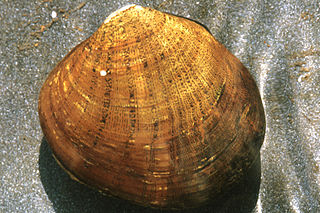
Dromus dromas, the dromedary pearlymussel or dromedary naiad, is a rare species of freshwater mussel in the family Unionidae. This aquatic bivalve mollusk is native to the Cumberland and Tennessee River systems in the United States, where it has experienced a large population decline. It is a federally listed endangered species of the United States.

The oyster mussel is a rare species of freshwater mussel in the family Unionidae. This aquatic bivalve mollusk is native to the Cumberland and Tennessee River systems of Kentucky, Tennessee, Alabama, and Virginia in the United States. It has been extirpated from the states of Georgia and North Carolina. It is a federally listed endangered species of the United States.

Lampsilis bracteata, also known as the Texas fatmucket, is a species of freshwater mussel, an aquatic bivalve mollusk in the family Unionidae, the river mussels.

Lampsilis higginsii is a rare species of freshwater mussel known as Higgins' eye pearly mussel or simply Higgins' eye. It is endemic to the United States, where it occurs in the upper Mississippi River and the drainages of some of its tributaries. It is threatened by the introduced zebra mussel. Lapsilis higginsii is a federally listed endangered species.
Hamiota perovalis, the orangenacre mucket or orange-nacre mucket, is a species of freshwater mussel, an aquatic bivalve mollusk in the family Unionidae, the river mussels.
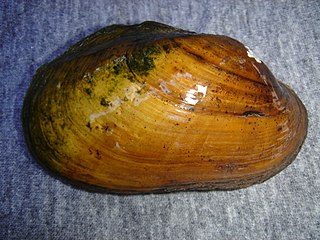
Lampsilis powellii is a rare species of freshwater mussel known by the common name Arkansas fatmucket. It is endemic to Arkansas in the United States, where it occurs in the Ouachita, Saline, and Caddo River systems. It is one of two mussels endemic to Arksansas, the other being speckled pocketbook. It is a federally listed threatened species of the United States.
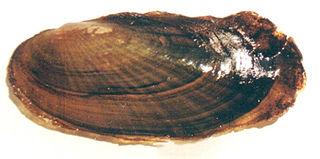
Leptodea leptodon, the scaleshell mussel or scale shell, is a species of freshwater mussel in the family Unionidae, the river mussels. This aquatic bivalve mollusk has disappeared from much of its historical range. It is endemic to the United States, where it is now present in four or fewer states; it is only found with any regularity in Missouri. It is a federally listed endangered species of the United States.

The Louisiana pearlshell, Margaritifera hembeli, is a rare species of bivalve mollusk in the family Margaritiferidae. This freshwater mussel is native to Louisiana in the United States, and was previously present also in Arkansas. It grows to a length of about 10 cm (4 in) and lives on the sand or gravel stream-bed in riffles and fast flowing stretches of small streams. Its life cycle involves a stage where it lives parasitically inside a fish. This mollusk is sensitive to increased sedimentation and cannot tolerate impoundments. Because of its limited range and its population decline, the International Union for Conservation of Nature has rated this mollusk as being "critically endangered".
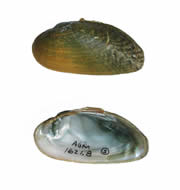
Medionidus parvulus, the Coosa moccasinshell, is a rare species of freshwater mussel in the family Unionidae, the river mussels. This aquatic bivalve mollusk is native to Georgia and Tennessee in the United States, and has been extirpated from the state of Alabama. It is a federally listed endangered species of the United States.

Medionidus penicillatus, the gulf moccasinshell, is a rare species of freshwater mussel in the family Unionidae, the river mussels. This aquatic bivalve mollusk is native to Alabama, Florida, and Georgia in the United States, where it is in decline and has been extirpated from most of the rivers it once inhabited. It is a federally listed endangered species of the United States.
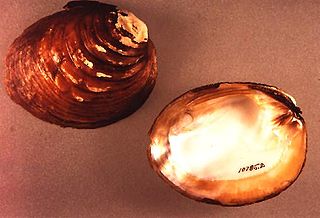
Plethobasus cicatricosus, the white warty-back pearly mussel or white wartyback, is a species of freshwater mussel in the family Unionidae, the river mussels. Once widely distributed in the Ohio, Cumberland, and Tennessee River systems in the United States, its range has declined dramatically to the point of near-extinction. It is a federally listed endangered species of the United States.
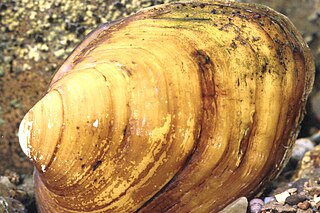
Plethobasus is a genus of freshwater mussels, aquatic bivalve mollusks in the family Unionidae, the river mussels.

Plethobasus cyphyus, the sheepnose mussel, is a species of freshwater mussel, an aquatic bivalve mollusk in the family Unionidae, the river mussels.
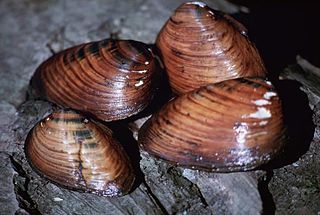
Pleurobema clava, the clubshell, club naiad or clubshell pearly mussel, is a species of freshwater mussel, an aquatic bivalve mollusk in the family Unionidae, the river mussels.
Pleurobema marshalli, the flat pigtoe or Marshall's mussel, was a species of freshwater mussel in the family Unionidae, the river mussels. It was native to Alabama and Mississippi, but it has not been seen since 1980. Though it is still listed as critically endangered on the IUCN Red List and as an endangered species on the US Endangered Species List, it is likely extinct.
The triangular kidneyshell is a species of freshwater mussel, in the family Unionidae, the river mussels. It is endemic to Alabama in the United States, where it is known from several rivers and streams in the Mobile River Basin. It is a federally listed endangered species of the United States.

Theliderma intermedia, the Cumberland monkeyface pearly mussel or Cumberland monkeyface, is a species of freshwater mussel in the family Unionidae, the river mussels. This aquatic bivalve mollusk is native to Tennessee and Virginia in the United States. Historically widespread in the upper Tennessee River system, it populations have been reduced by habitat destruction and pollution. It now only occurs in two tributaries: the Duck and Powell Rivers. It is a federally listed endangered species.

The environment of Iowa has been heavily affected by agricultural production since it became a U.S. state in 1846. However, there remain natural areas in Iowa that reflect a wide varieties of environmental niches.

















